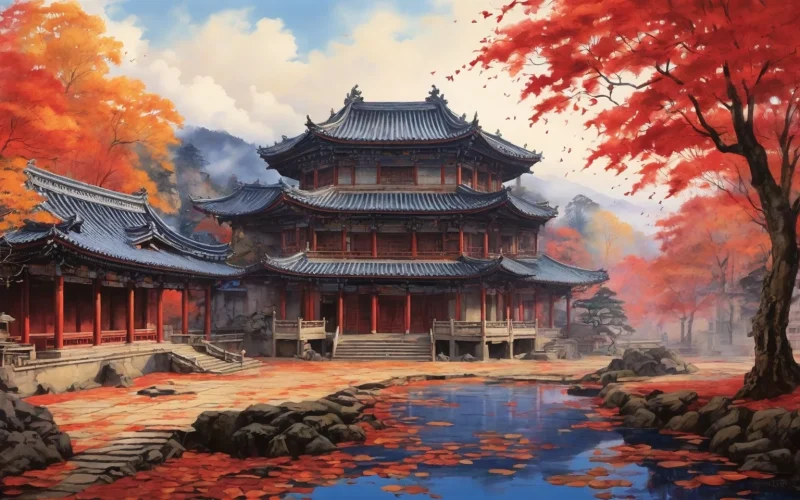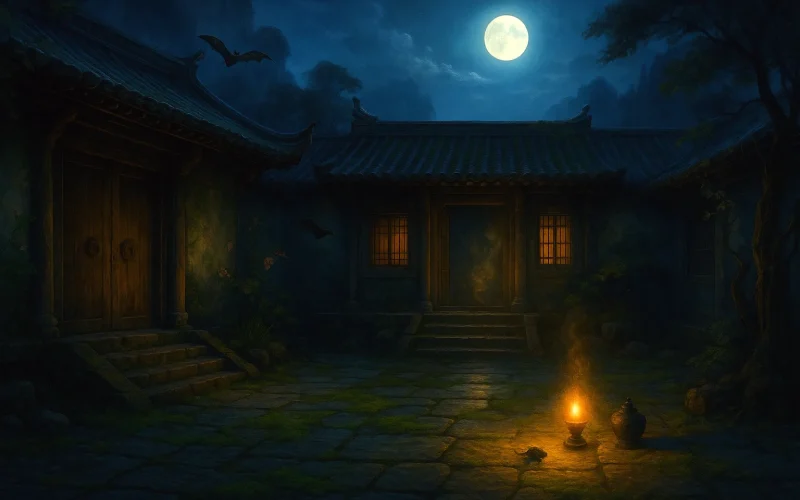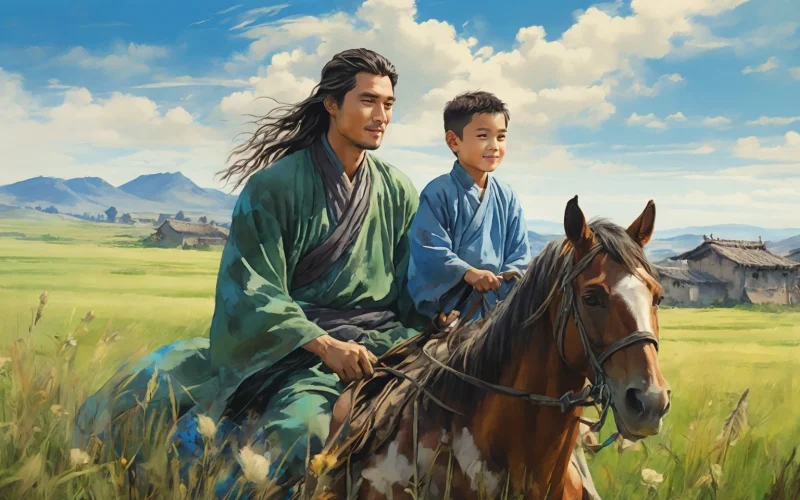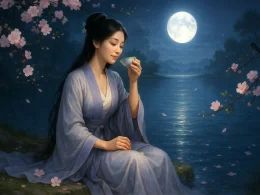The crickets' chirp breaks twilight late;
In the West Wood I meditate.
I hear a shower cold which grieves,
But outdoors I see fallen leaves.
The capital's weal and woe wake
Our dream to float on Dongting Lake.
Sink or swim, you will go your way;
You won't come back but go astray,
Original Poem
「秋寄从兄贾岛」
无可
螟虫喧暮色,默思坐西林。
听雨寒更彻,开门落叶深。
昔因京邑病,并起洞庭心。
亦是吾兄事,迟回共至今。
Interpretation
Wuke, a Tang Dynasty monk-poet and cousin of Jia Dao, composed this poem during deep autumn while in retreat at West Forest Temple on Mount Lu. Having once shared monastic life with Jia Dao before his return to secular pursuits, Wuke here expresses profound fraternal longing and quiet admonition, revealing a hermit's transcendent perspective on worldly attachments.
First Couplet: "螟虫喧暮色,默思坐西林。"
Míng chóng xuān mù sè, mò sī zuò Xīlín.
Crickets clamor through twilight's hue, In West Forest's silence, thoughts of you.
The opening juxtaposes nature's twilight chorus against the monk's meditative stillness. The insects' audible presence (喧) paradoxically amplifies the poet's silent remembrance (默思), establishing the poem's contemplative mood through sensory contrast.
Second Couplet: "听雨寒更彻,开门落叶深。"
Tīng yǔ hán gèng chè, kāi mén luò yè shēn.
Rain's chill penetrates night's watch, At dawn - leaves piled where doors unlatch.
This couplet masterfully traces time's passage from auditory to visual perception. The autumnal rain's penetrating cold (彻) gives way to tangible evidence of time's accumulation (深) - a metaphor for both seasonal change and life's transient nature.
Third Couplet: "昔因京邑病,并起洞庭心。"
Xī yīn jīng yì bìng, bìng qǐ Dòngtíng xīn.
Capital ills once made us pine, Lake retreats beckoned in that time.
The recollection of shared disillusionment ("capital ills" implying both physical and spiritual malaise) reveals their common yearning for Dongting Lake's refuge. The dual meaning of "illness" critiques official life's corrosive effects.
Fourth Couplet: "亦是吾兄事,迟回共至今。"
Yì shì wú xiōng shì, chí huí gòng zhì jīn.
These too are my brother's cares - Your lingering prolongs our prayers.
The conclusion blends fraternal concern with gentle admonishment. The phrase "lingering prolongs" (迟回) delicately urges Jia Dao to abandon worldly hesitation, while "our prayers" suggests their enduring spiritual bond despite physical separation.
Holistic Appreciation
"Written in Autumn for My Cousin Jia Dao" is a work of serene elegance and deep emotion. Sitting alone in the western woods, the poet channels the autumn night’s ambiance to express longing for his cousin. The first two couplets depict falling leaves, insect calls, and cold rain, crafting an atmosphere of solitary desolation where scene and sentiment merge into a tranquil, far-reaching vision. The latter couplets transition to reflection, recalling the hardships of the capital and aspirations for reclusion, revealing both concern for Jia Dao and quiet expectations. Dominated by stillness, the poem carries profound imagery—subtle yet emotional, calm yet dynamic. Beyond kinship, it conveys the poet’s transcendent detachment from worldly affairs.
Artistic Features
The poem employs a "scene-infused-with-emotion" technique, using the quiet depth of an autumn night to mirror inner longing. Its structure is clearly layered: the first half paints a scene with chirping insects, rain sounds, and falling leaves to accentuate solitude, while the second shifts to reminiscence and consolation, conveying restrained yet profound emotion. Contrasts abound—the clamor of crickets versus the silence of contemplation, the sound of rain mistaken for falling leaves—revealing the poet’s acute sensitivity and interwoven thoughts. Additionally, the "falling leaves" symbolize returning to one’s roots, subtly suggesting that one should follow their true nature and withdraw from worldly distractions, enriching the poem with philosophical depth.
Insights
This poem reminds us to cherish familial bonds and return to our true selves amid life’s chaos. Using falling leaves as a metaphor for returning to one’s roots and night rain to depict loneliness, the poet expresses deep affection for his cousin while embodying detachment from fame and transience. In the face of life’s complexities, maintaining inner peace and clarity may well be the path to stability and fulfillment.
Poem translator
Xu Yuanchong (许渊冲)
About the poet
Wuke (无可, fl. Tang Dynasty), a Buddhist monk-poet from Zhuozhou, Hebei, was the younger cousin of the renowned poet Jia Dao. Ordained in childhood, he associated with literary figures like Yao He and Liu Deren. His poetry inherited Jia Dao's "austere lyricism" (苦吟) while cultivating an even more serene and reclusive tone, often depicting mountain temple landscapes and Zen-inspired meditations. Ninety-eight of his works survive in the Complete Tang Poems anthology.












